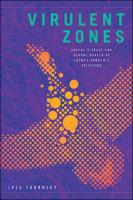Virulent Zones
Animal Disease and Global Health at China's Pandemic Epicenter
Author(s)
Fearnley, Lyle
Collection
Knowledge Unlatched (KU)Language
EnglishAbstract
Scientists have identified southern China as a likely epicenter for viral pandemics, a place where new viruses emerge out of intensively farmed landscapes and human--animal interactions. In Virulent Zones, Lyle Fearnley documents the global plans to stop the next influenza pandemic at its source, accompanying virologists and veterinarians as they track lethal viruses to China's largest freshwater lake, Poyang Lake. Revealing how scientific research and expert agency operate outside the laboratory, he shows that the search for origins is less a linear process of discovery than a constant displacement toward new questions about cause and context. As scientists strive to understand the environments from which the influenza virus emerges, the unexpected scale of duck farming systems and unusual practices such as breeding wild geese unsettle research objects, push scientific inquiry in new directions, and throw expert authority into question. Drawing on fieldwork with global health scientists, state-employed veterinarians, and poultry farmers in Beijing and at Poyang Lake, Fearnley situates the production of ecological facts about disease emergence inside the shifting cultural landscapes of agrarian change and the geopolitics of global health.
Keywords
Science; Philosophy & Social Aspects; Medical; Public Health; Social Science; Anthropology; Cultural & SocialDOI
https://doi.org/10.1215/9781478012580ISBN
9781478090502Publisher
Duke University PressPublisher website
https://www.dukeupress.edu/Publication date and place
2020Grantor
Imprint
Duke University PressClassification
Philosophy of science
Public health and preventive medicine
Social and cultural anthropology


 Download
Download